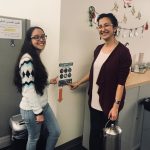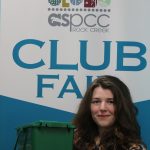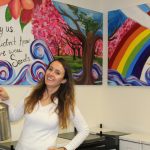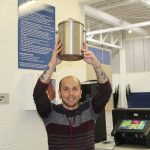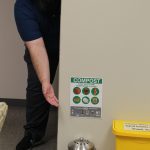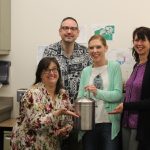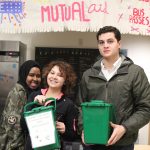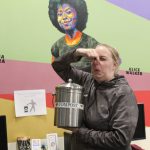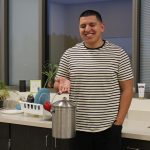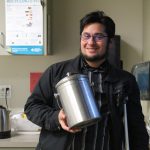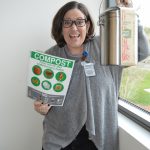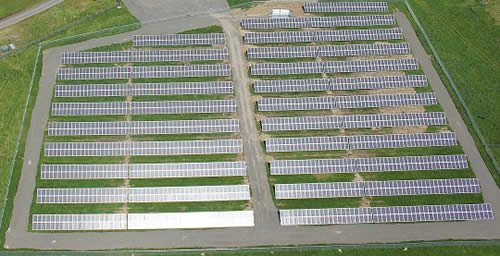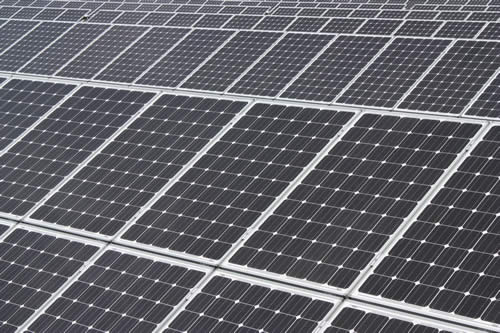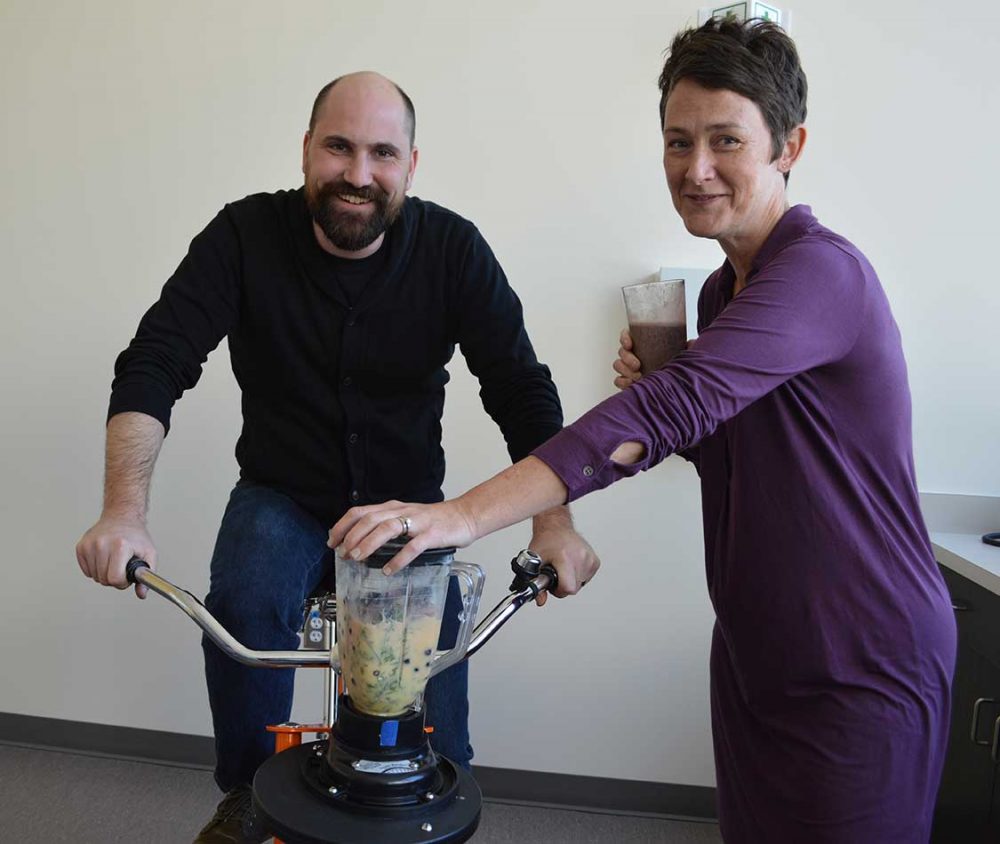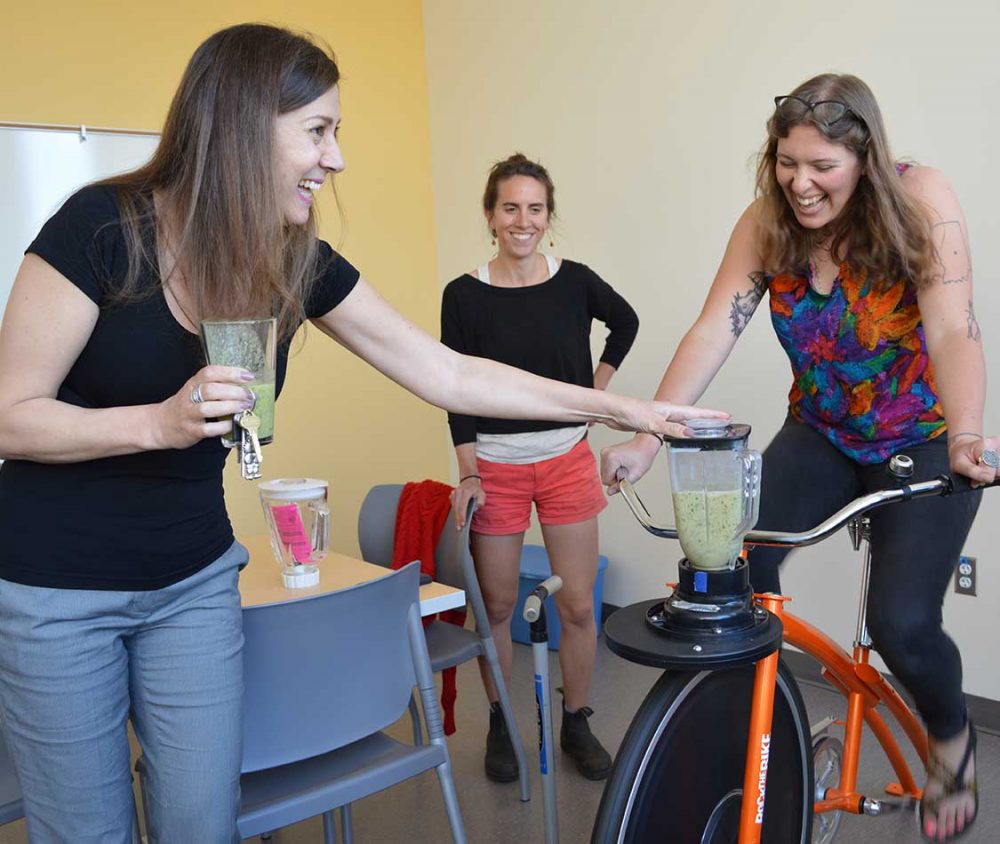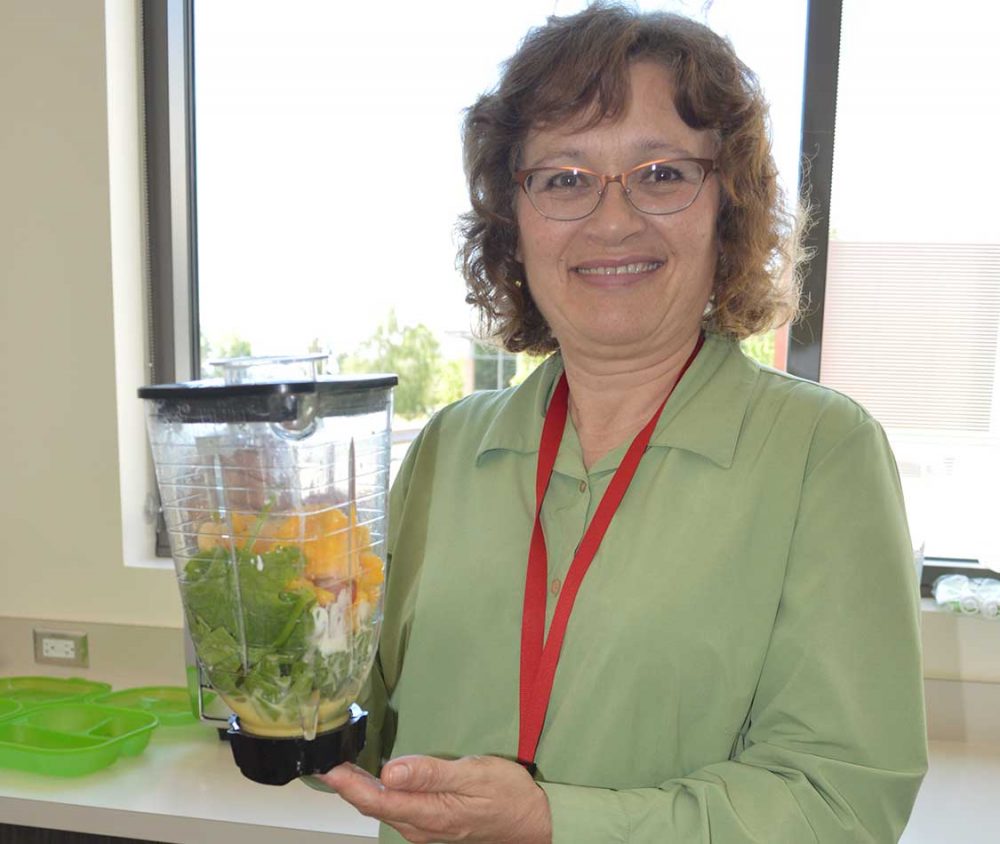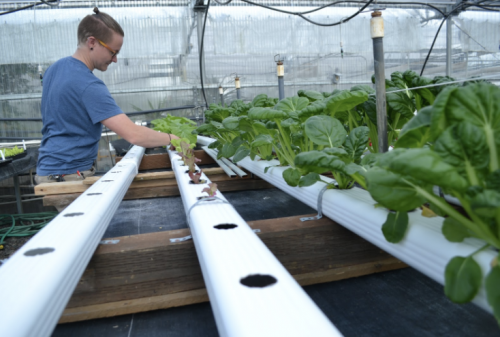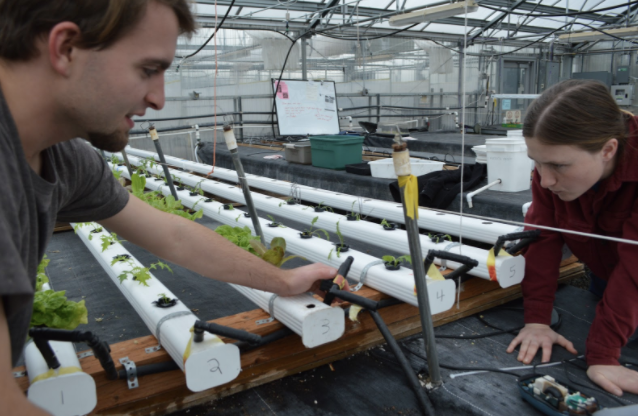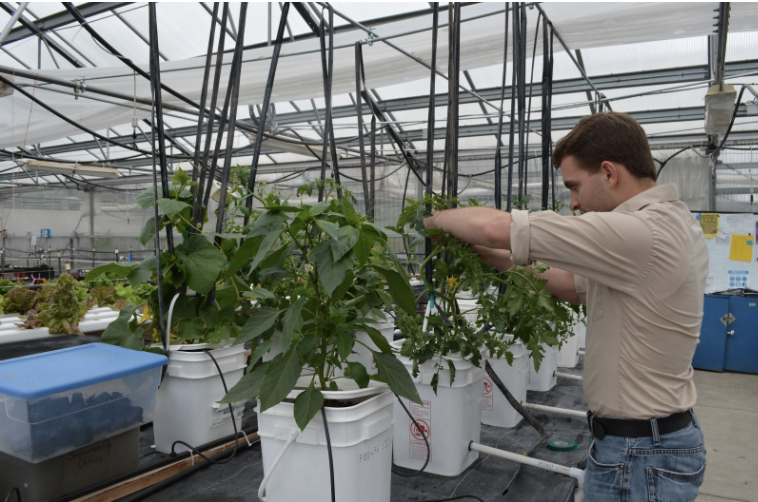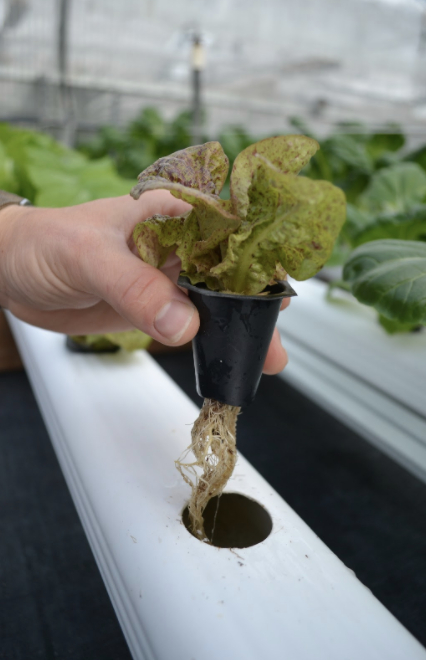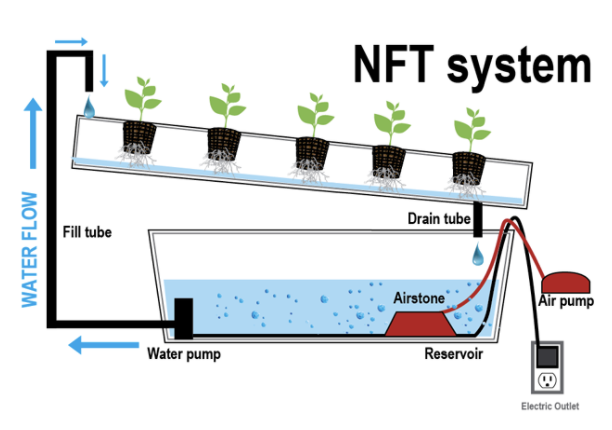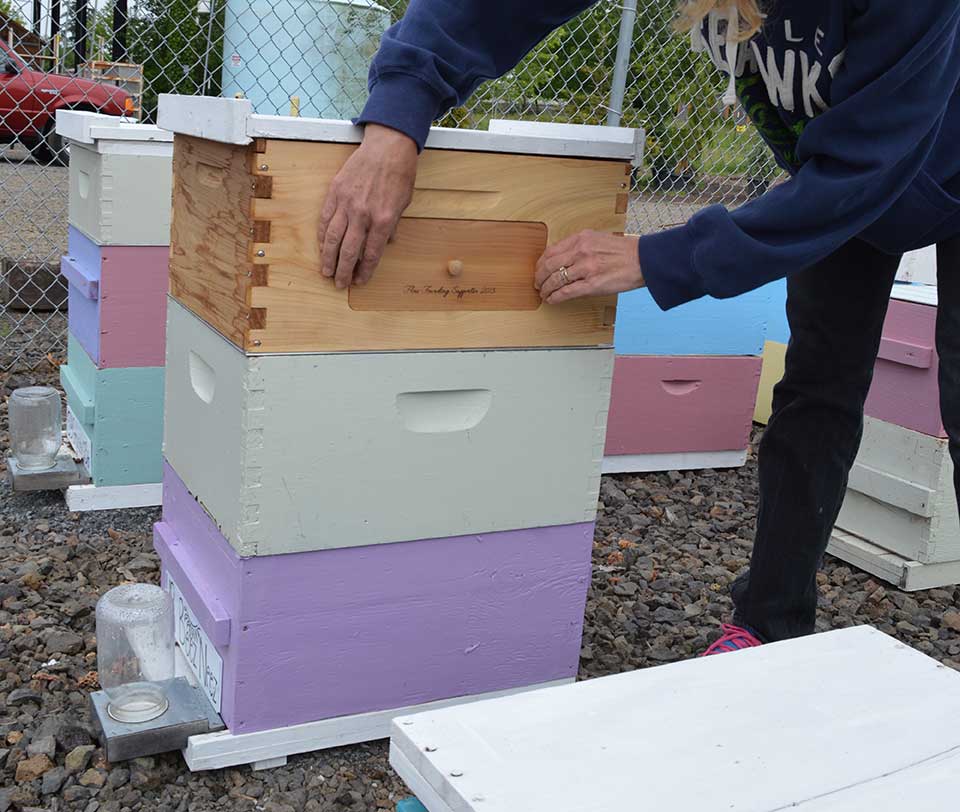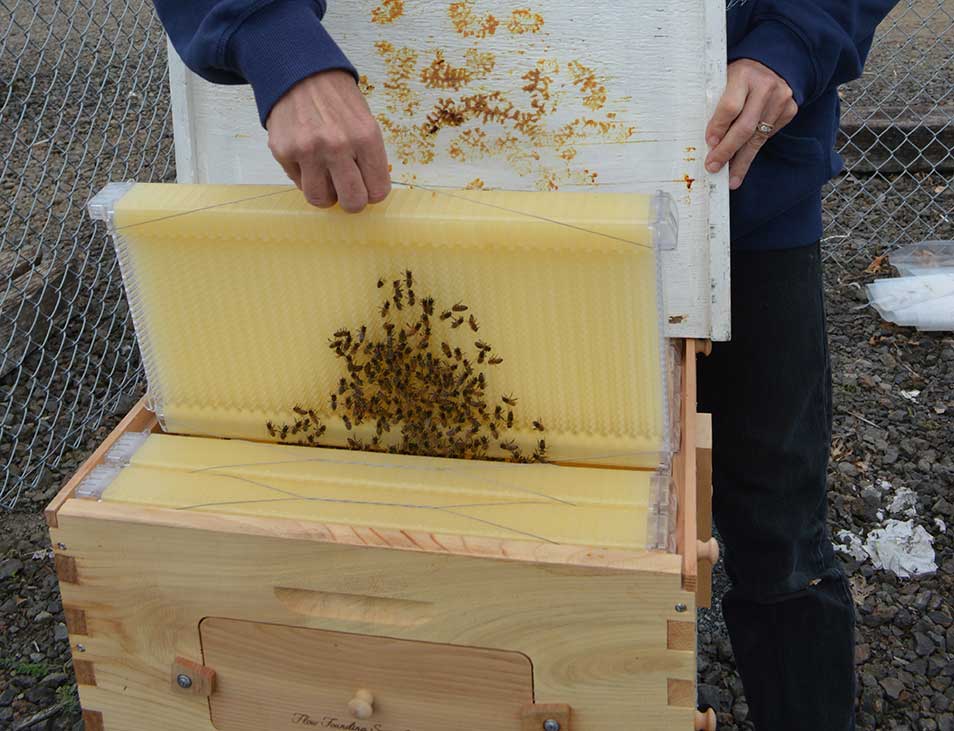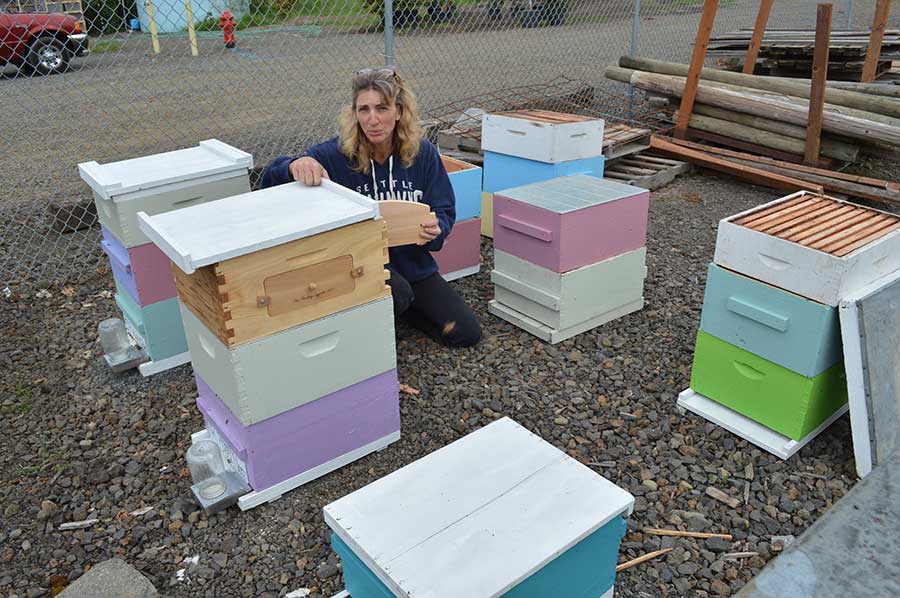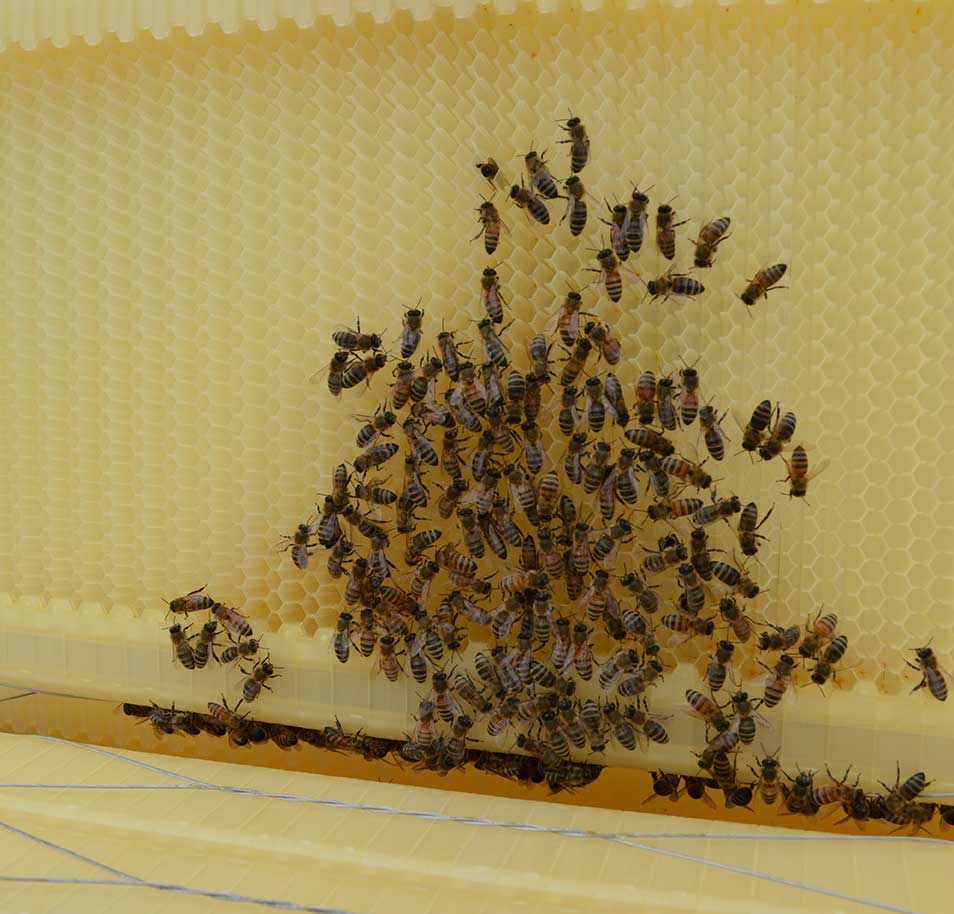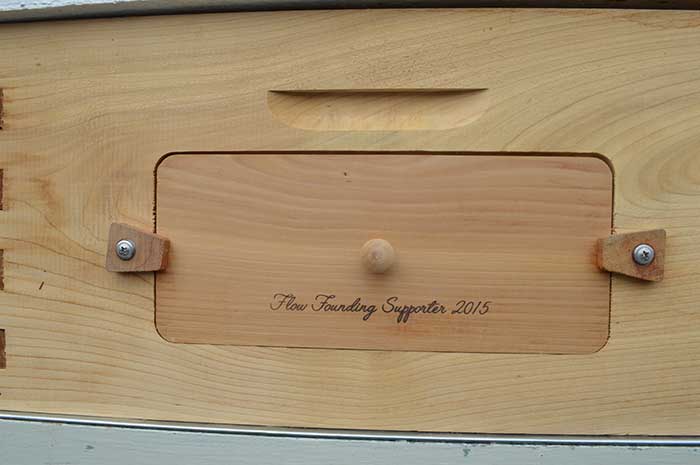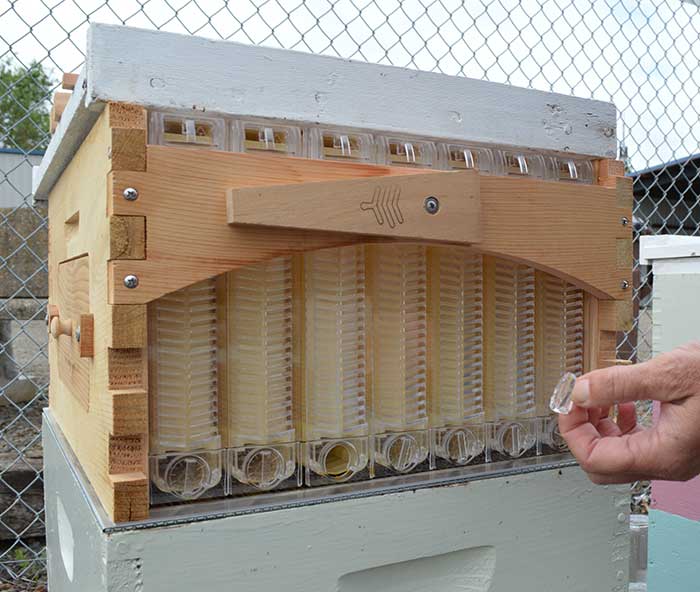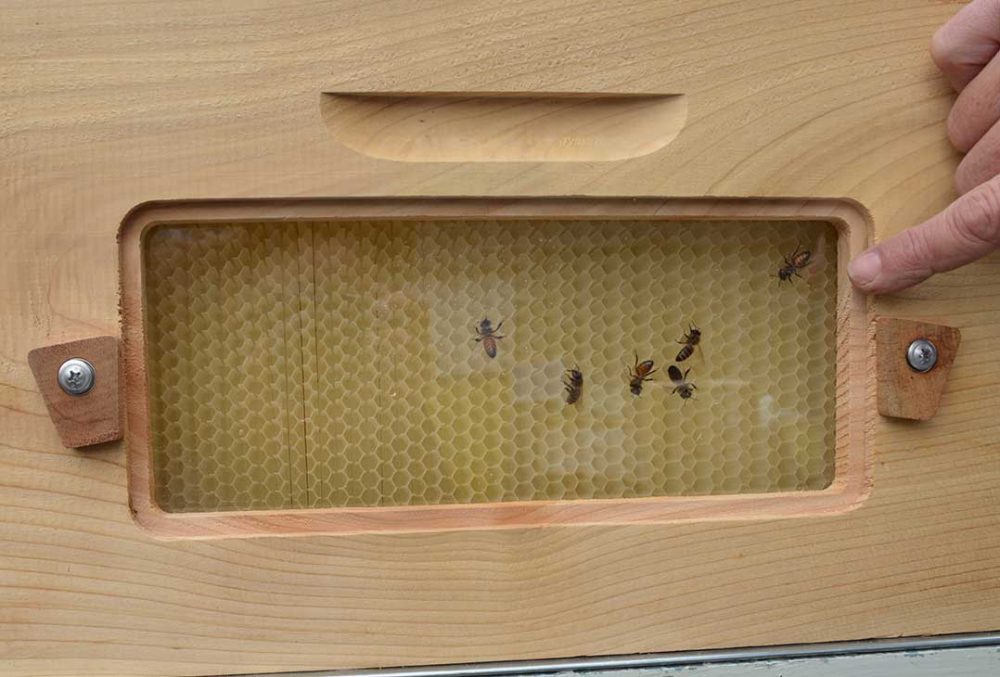Sustainable Practices and Programs
The PCC Rock Creek Sustainability team supports innovative ways to practice environmental stewardship in our operations. We consider projects that helps us improve our service delivery, benefit our community and reduce our impact on the environment.
Here are some of the special projects we have implemented to further these objectives.
Composting
Compost is simply decomposed organic matter. Composting is a natural process of recycling organic matter such as food waste, coffee grounds, leaves and other material that has lived or grown recently into a rich soil amendment.
Why Compost?
Benefits of composting include:
- Reducing the amount of waste destined for landfills
- Reducing carbon emissions from transportation to landfills and methane emissions from the landfills
- Converting waste product into material that is useful for gardening, landscaping, agriculture and houseplants
- Instilling a sense of environmental stewardship
- Encouraging production of beneficial bacteria and fungi that break down organic matter to create humus, a rich nutrient-filled material
- Helping sequester carbon dioxide in soil
- Demonstrating scientific principles, inquiry and discovery
- Creating a fertilizer product that is less toxic than chemicals alternatives
- Loosening clay soils and helps sandy soils retain water
- Helping soil fertility and stimulating healthy root development in plants
- Providing food for microorganisms
- Suppressing plant diseases and pests
- Replacing trace minerals in soils
- Reducing storm runoff and soil erosion
Composting on Campus
Compost is a critical operation on the Rock Creek campus. We have a multi-component composting system that generates rich soil amendment that is returned to the Learning Garden ensuring our soil health.
Worm Bin
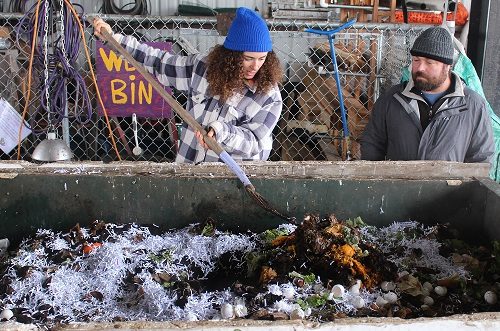
The showcase feature of our composting system is our thriving vermicomposting system, housed in a worm composter bin, a Worm Wigwam crafted by Sustainable Agriculture Technologies, Inc. in Cottage Grove, Oregon. Comprised of a large specially designed box capable of holding two tons of material, the bin is filled with compostable material and red wiggler worms. The worms, aloing with other beneficial insects process the material into worm castings, a dark, nutrient rich, healthy compost which we use as a soil amendment in our Learning Garden.
Finished compost is harvested from the worm bin using a winch that scrapes a grate across the bottom of the bin, releasing the fully processed compost.
The Learning Garden worms have received international attention and serve as a highlight in our Closed Loop System tours to campus classes and community groups.
Worm nursery
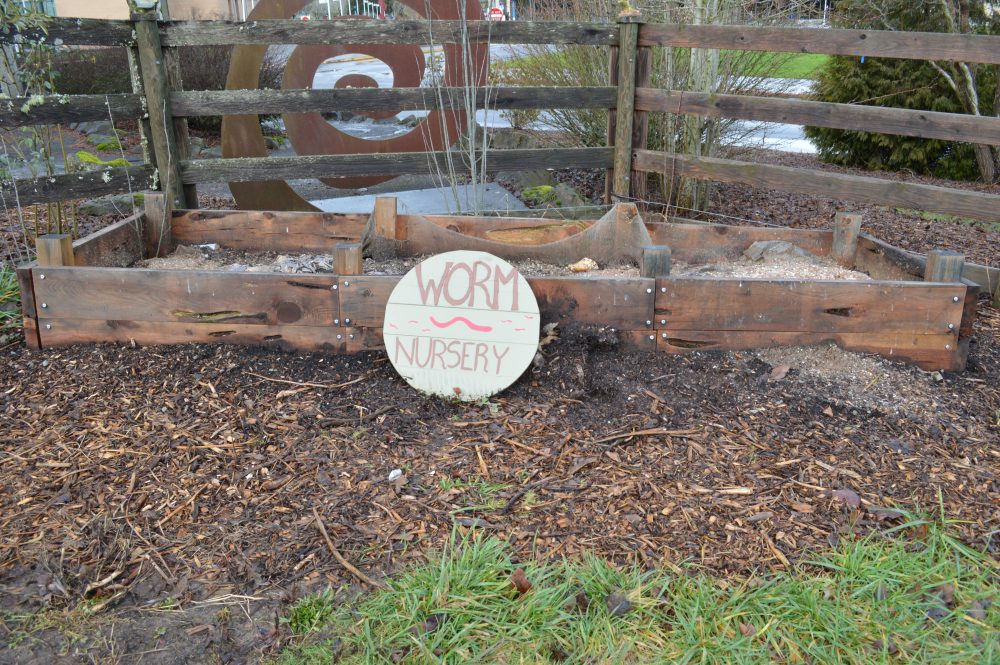 The worm nursery serves to replenish our vermicomposting system. A large Juniper wood raised bed filled with post-consumer food waste and tea and coffee grounds, our nursery is specifically designed to propagate and cultivate red wigglers. We then harvest the wigglers and transplant them in our vermicomposting bins where they kick into high gear and make high quality, great compost for our garden.
The worm nursery serves to replenish our vermicomposting system. A large Juniper wood raised bed filled with post-consumer food waste and tea and coffee grounds, our nursery is specifically designed to propagate and cultivate red wigglers. We then harvest the wigglers and transplant them in our vermicomposting bins where they kick into high gear and make high quality, great compost for our garden.
Aged animal manure
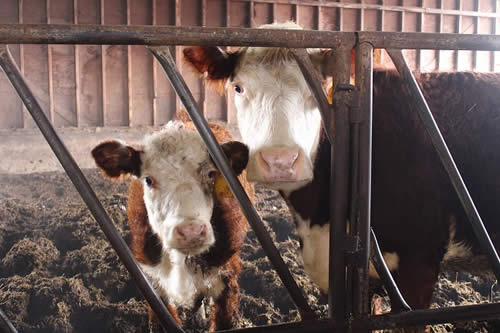 The RC Campus has a working farm with livestock, large and small. Campus animal manure is aged and used as a composted soil amendment around our campus. Aged manure compost helps build the organic matter content, adds nutrients, increases microbial activity and improves drainage and moisture retention capacities in soil and enhances the health and beauty of our campus landscaped areas..
The RC Campus has a working farm with livestock, large and small. Campus animal manure is aged and used as a composted soil amendment around our campus. Aged manure compost helps build the organic matter content, adds nutrients, increases microbial activity and improves drainage and moisture retention capacities in soil and enhances the health and beauty of our campus landscaped areas..
Note: Thank you for your interest – we only use manure generated by the campus farm
Geobin with a compost aerator tool
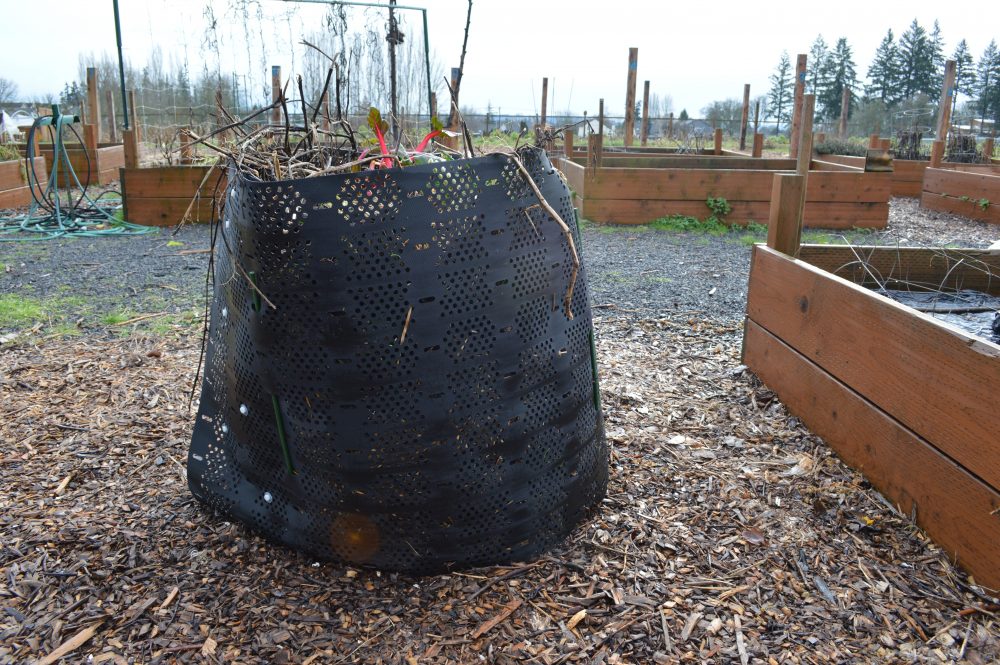 The Geobin is a flexible, expandable compost bin that allows for ventilation, drainage and rapid decomposition for compost production. The Rock Creek Learning Garden uses the Geobin in combination with the Compost Crank & Twist aerator.
The Geobin is a flexible, expandable compost bin that allows for ventilation, drainage and rapid decomposition for compost production. The Rock Creek Learning Garden uses the Geobin in combination with the Compost Crank & Twist aerator.
Black compost bin by EnviroWorld
Our FreeGarden EARTH compost bin provides us 11 cubic feet of capacity and generates high quality compost. A slower processor than the Sun Mar rotating bin and the GeoBin used with the Crank & Twist, this system allows us to compare results with a more traditional system. And one that is frequently available to backyard composters in our Portland Metro area.
All compost generated by our compost system is produced from campus based materials and is reintroduced into the Learning Garden to enrich the soil and growing environment, supporting high quality herbicide, pesticide and chemical free crops.
While we keep most of our food and green waste on campus to use on our campus grounds, not all of the food waste can remain on site. A large part of the post-consumer waste comes from food left over at catering and food service lines and buffets. Much of this food cannot be composted in our learning garden or worm bin. Therefore, we have one collection bin for post-consumer green waste (meat, fried food, fats, processed food, etc.) that is collected weekly by our waste hauler. This food waste ends up at JC-Biomethane Biogas Plant in Junction City, Oregon.
The facility is designed to take in not only food but grease trap waste along with grass straw to render heat, biomethane, and a liquid/fiber fertilizer. The biogas is used onsite to produce enough electricity to power at least 1500 homes (1.55 MW).
Recology
While we use 100% of the compost generated by our loop system, our compost needs are much greater than we can supply ourselves. We partner with Recology to provide the balance of the compost needed in the Garden.
Recology conducts curbside compost collection throughout the city of Portland and transforms this waste into a high quality, nutrient rich soil amendment that we use to fill our raised beds and amend our field crops. Recology operates Nature’s Needs in North Plains and describes their operation thusly
“This site currently processes approximately 50,000 tons of yard trimmings, municipal organics, and land clearing materials each year.
Nature’s Needs uses a bio-covered aerated static pile with negative air and biofilters to optimize the composting process. This system produces the best and highest quality compost from the incoming feedstock.
Nature’s Needs’ quality assurance program includes routine nutrient, metal and pathogen analysis to ensure a high quality, consistent product that meets the needs and high expectations of our customers.“
All compost produced by Recology meets federal standards and is certified organic by OMRI, Nature’s Needs epitomizes the loop concept on a large scale – community-wide food waste to compost to soil amendment used to produce more food. We are delighted to have such a stellar example and resource as our neighbor!
Education
Using different compost systems allows us to increase the educational benefit to our students and community. Organic waste is collected daily by students and staff from central deposit locations across campus. This waste is then weighed, documented and placed in the various compost systems.
This hands-on learning provides us many opportunities for further exploration:
- We collect input data – specifically weight of the various locations and types of waste input. Ex., pre-consumer food waste from cafeteria food prep, coffee and tea from office area collections, post-consumer food waste from students
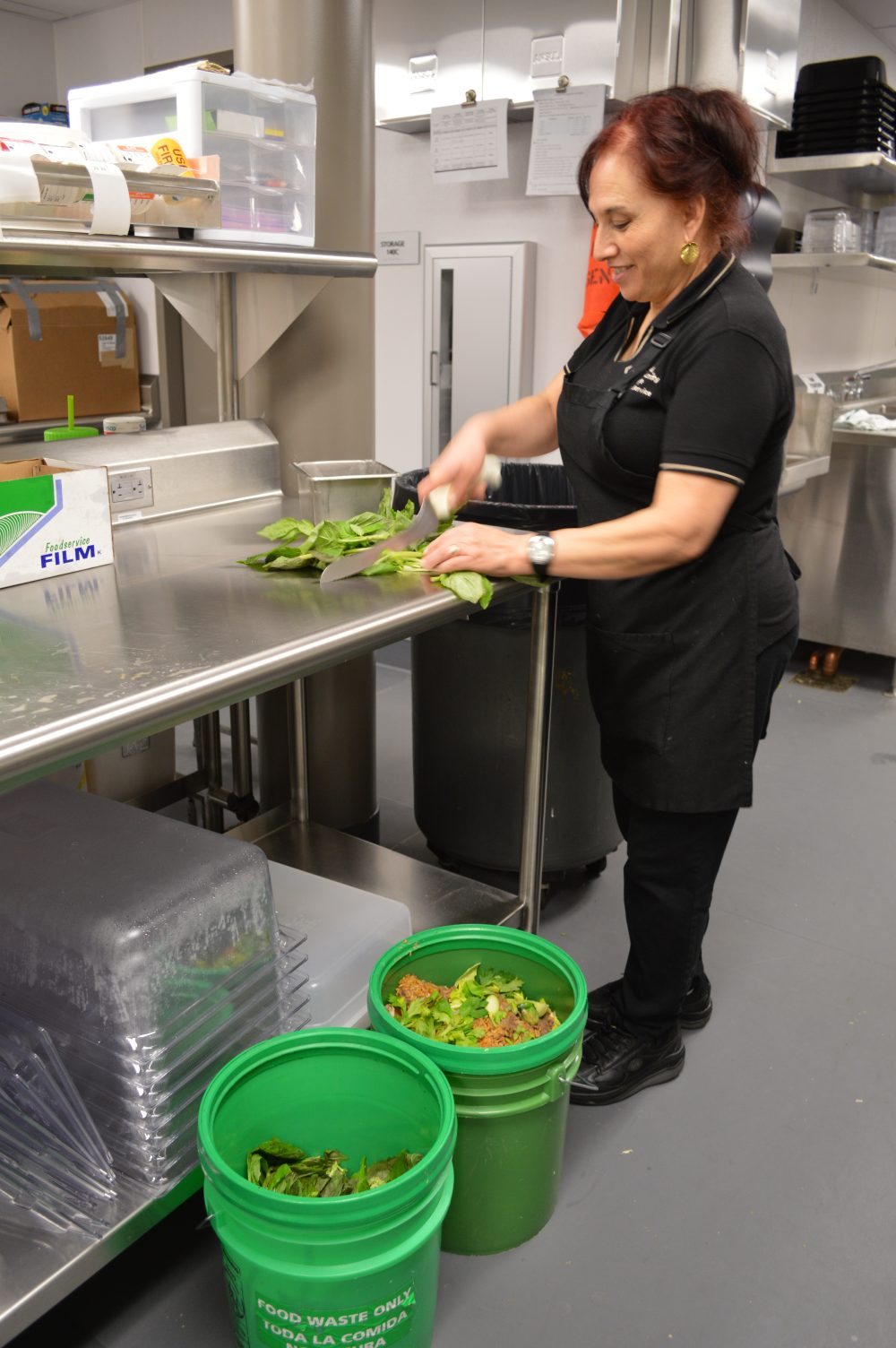
- We collect output data – comparing results from various sources and processing systems. Ex., weight of compost produced from our InSinkerator system that grinds pre- and post- consumer waste, tea and coffee grounds.
- We compare the volume and rate of compost production
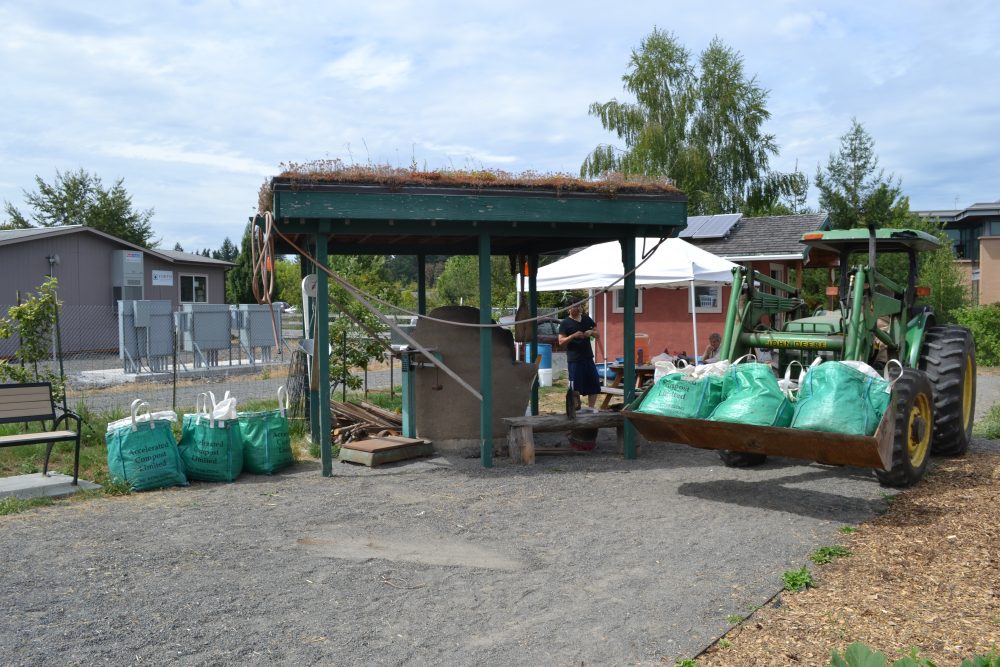
- We compare the quality of the compost produced
- We have various compost systems for demonstration
- We offer experiences and inspiration to meet different instructional objectives (ex., writing, biology, art, health, etc.)
In addition to the operations listed above, all organic landscaping waste (from grounds maintenance, tree pruning, forest management, etc) from our 260 acre campus is retained for composting on campus. Much of the larger material is ground to mulch and then used as part of the landscape maintenance on the Rock Creek and other PCC Campuses.
The Rock Creek Loop
Closed loop systems are a model of sustainability, transforming waste into nourishment within a community. Here at Rock Creek, we continuously strive to reduce and repurpose waste, and to feed more people from our on-site food production. Here’s how our loop works: we compost 99% of the pre-consumer waste produced on campus, and much of the post-consumer waste. This food waste, in turn, becomes food for our worms, who transform it into healthy compost to fuel the Learning Garden. The vegetables, fruit and flowers from the garden go to our farm stand, our volunteers, and local donation centers, where they become nourishment for the people of our community. Watch the video below for even more information, and to see the Rock Creek Loop in action.
Durables in Catering
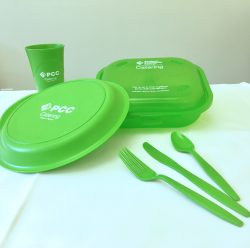 These 100% recycled, BPA and melamine free, everyday tableware are made in the USA by the certified B-corp Preserve. Unlike their single use cousins we’re all so used to, these beauties are made to last, so remember, don’t throw them away!
These 100% recycled, BPA and melamine free, everyday tableware are made in the USA by the certified B-corp Preserve. Unlike their single use cousins we’re all so used to, these beauties are made to last, so remember, don’t throw them away!
This will be the new default for catered events through Dining Services. If you are in need of disposables due to grab-and-go style events, please specify this when ordering. Dining Services will still offer their china service for an additional cost.
Solar Power
The Garden is located immediately adjacent to the College’s Solar Farm. The 35,000 square foot, 500-kilowatt array is the result of a partnership between PCC and the Energy Trust of Oregon, SolarCity, SolarWorld and the Oregon Department of Energy.
SolarCity monitors power production at all times. They have provided us easy online access to view solar monitoring of the PCC Rock Creek Solar Farm. Take a look and see how consumption and output vary with the seasons and weather.
Fender Blender Bikes
The Rock Creek campus currently has two Fender Blender Bikes that were purchased with money from The Green Initiative Fund in 2008. The bike is stationary with a blender attached to the front that churns when the wheels are in motion. The process is simple: you pick out your ingredients, throw them in the blender and pedal. The bike also has a Pedal Power Utility Box, which allows you to generate power to play music while you spin.
The company, Rock the Bike, is a San Francisco based company founded by Paul Freedman in 2003 though the Fender Blender was not created until 2007. Freedman created it as a way to show people how their pedal power could be used for practical purposes. Learn more about Rock the Bike.
School Events
Interested in using a blender bike for your PCC-associated event? There are currently two on campus: one is located in the Social Science, Communication and Health Division break room in Building 5 and there is a second bike located in ASPCC storage. For more information, contact: Elaine Cole, Sustainability Coordinator.
Hydroponics
The Rock Creek Campus houses multiple hydroponics systems that help educate students a different way to grow food. Hydroponics is a method of growing plants that does not require soil. Instead, the plant roots are supported in an inert medium, such as rockwool, perlite, clay pellets, peat moss, or vermiculite. The roots touch a water-based nutrient solution, but still have access to oxygen (with supplemental oxygen from air stones in the nutrient tank). Under the right conditions, plants grown hydroponically can mature up to 25% faster and produce 30% more than plants grown in soil. The plants in a hydroponic system are dependent upon the fresh water supply so if a pump fails, the plants can die within 24 hours because the soilless mediums do not retain water as well as soil does. The system needs careful monitoring of pH and nutrient levels on a regular basis to ensure maximum production from the plants.
There are two types of hydroponic systems that run on closed loops at PCC Rock Creek in the Landscape Technology Greenhouse (by Building 4): Nutrient Film Technique and Dutch Bucket systems. Both were established from an Eco Social Justice grant received in 2014. Sustainability staff and students in the Landscape Technology program helped construct and set up the systems.
Nutrient Film Technique (NFT)
In this system, our plants are housed in rain gutters that are built on a slight decline. Gravity continuously runs a thin film of nutrient solution through the tips of the plants’ roots downstream. The roots have a constant supply of water, nutrients, and oxygen. The nutrient solution returns back into a reservoir where a pump then recirculates to the top of the system at the gutters higher end. These systems are great for growing leafy greens like lettuce, mizuna, or spinach, and herbs like basil and cilantro.
Dutch Bucket System
This hydroponic system uses buckets and soilless media to support larger fruiting plants such as tomatoes, melons, or peppers. The soilless media we use consists of clay pebbles, called hydroton. The nutrient solution is distributed through irrigation piping at the top of each bucket. The solution flows through the roots and into a collection pipe that returns to the reservoir for recirculation. It is best to use cucumbers, tomatoes, green peppers with trellises in Dutch Bucket systems.
Do you have experience in hydroponics or have you ever wanted to learn? The Rock Creek Sustainability Office looks for interested volunteers during winter and spring quarters to assist with growing food using our hydroponics systems. Contact us for more information about the hydroponics systems or to learn about volunteer opportunities.
Pedal Power
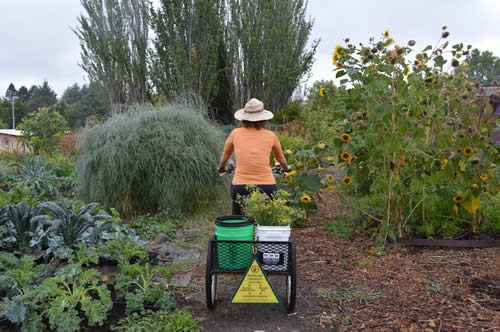
The Sustainability Office is dedicated to reducing our impact on the environment. One way we do this is by opting to use pedal power over fossil fuels wherever possible in our work.
The Learning Garden’s compost operations and closed loop system are spread out across Rock Creek’s 260 acre campus. We use a trike to move buckets of compost from the cafeteria to a compost staging room. The compost is weighed and then added to the worm bin where it becomes food for red wriggler worms. The large metal basket on the back of the trike was constructed by the Rock Creek Welding program. During the growing season, we use a bike trailer to move supplies and produce from the Learning Garden to the farm stand.
Honey Flow Hive
Our first honey flow hive was added to the apiary in 2015. This unique honey harvesting system was invented by a father and son team, Stuart and Cedar Anderson, from Australia. PCC was one of the Founding Supporters of their crowdfunding campaign.
The Flow™ frame fits into a standard Langstroth super, with two simple doorways cut in one end of the box to allow access for honey collection and end frame observation. The Flow™ frame consists of partly formed honeycomb cells. The bees complete the comb with their wax then fill the cells with honey, before finally capping the cells. Inside the honeycomb, the cells split and turn into channels allowing the honey to flow. The bees remain undisturbed on the surface of the comb, with plenty of room to prevent any injury to the bees. Overall, the Flow hive provides a revolutionary beekeeping method as it allows absolute ease of honey harvesting with minimal disturbance to the bees and their natural functioning. We’re very excited to have it as part of our apiary!
Pen and Marker Recycling
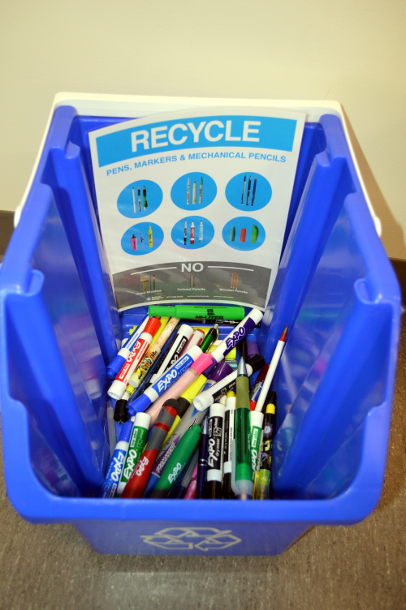
In 2017 PCC reinstated a program through the company TerraCycle, to collect pens, pencils and markers. Boxes and signs are placed throughout campus to recycle pens and pen caps, mechanical pencils, markers and marker caps, permanent markers, and permanent marker caps. Offices can request a bin or have them emptied when they are full by submitting a work order at the Service Request Center or calling ext. 4800.
Fryer Oil to Biodiesel
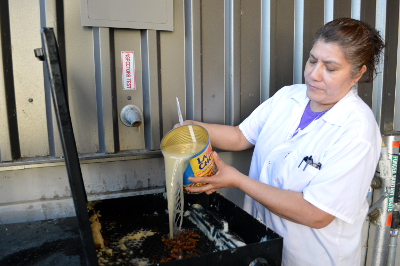 Portland Community College partners with a local Portland company, SeQuential to take our used fryer oil through their Producing Useful Renewable Energy (PURE) program. The PURE program streamlines used cooking oil collection by integrating collection with our cooking oil purchase agreement. The fryer oil that is produced in Salem, Oregon by Ventura Foods. SeQuential and Ventura Foods are partners in the oil production and recovery. The oil bin is picked up once a month and taken to their Salem refinery to be made into biodiesel. SeQuential biodiesel works like petroleum diesel, except it’s sourced from recycled oils instead of fossil fuels. It can be blended with—or fully replace—petroleum diesel and has far less impact on our environment.
Portland Community College partners with a local Portland company, SeQuential to take our used fryer oil through their Producing Useful Renewable Energy (PURE) program. The PURE program streamlines used cooking oil collection by integrating collection with our cooking oil purchase agreement. The fryer oil that is produced in Salem, Oregon by Ventura Foods. SeQuential and Ventura Foods are partners in the oil production and recovery. The oil bin is picked up once a month and taken to their Salem refinery to be made into biodiesel. SeQuential biodiesel works like petroleum diesel, except it’s sourced from recycled oils instead of fossil fuels. It can be blended with—or fully replace—petroleum diesel and has far less impact on our environment.
Better World Books
Portland Community College collects unwanted books from its campus libraries, staff and students that are repurposed by Better World Books. Collection sites are in the PCC Bookstore at all four campuses. When purging larger quantities of books, empty Better World Books boxes may be requested at no cost from the Central Distribution Services warehouse by contacting stores@pcc.edu. Once filled, pickup can be requested by filling out and submitting a Facilities Request here (select Maintenance/Repair and Moves/Surplus in your order).
Better World Books is an online bookseller of used and new books founded in 2002 that donates books or a percentage of its profit to literacy programs around the world. Better World Books donates one book to Feed the Children, Books for Africa, or smaller donation recipients for each book sold on BetterWorldBooks.com.
Better World Books provides additional support to literacy non-profits including:
- Books for Africa: Collects, ships and distributes books to African children
- The National Center for Family Literacy: Provides educational opportunities and literacy programs to at-risk children and families
- Room to Read: Builds libraries and schools and provides scholarships in impoverished areas of the world, including Southeast Asia and also publishes books for children in multiple languages
- Worldfund: Provides resources to improve English-language skills in Latin America
- Prison Book Project: A Quincy, Massachusetts-based nonprofit, which provides inmates with books and legal resources
- Robinson Community Center: A University of Notre Dame-affiliated community center, which provides educational opportunities and tutoring services in South Bend, Indiana
- National Literacy Trust: An independent charity based in London, England, that promotes literacy
- READ International: A charity that aims to improve access to education in East Africa by relocating books which are no longer needed in UK secondary schools to Tanzania.
Better World Books has raised millions of dollars for literacy, saved millions of books from landfills, created jobs for hundreds of people, and provided wonderful books to millions of readers worldwide.
PCC Plastic Film Recycling Collection Program
Portland Community College is excited to be reducing its waste by participating in a plastic film recycling program. Key work areas (ex. bookstores, warehouses, dining services, print shops and others) throughout PCC that generate lots of plastic film, collect and store the material, which is periodically picked up and taken to a local grocery store depot. From there, the plastic film material makes its way to TREX, a major manufacturer of wood-alternative decking, railings and other outdoor items made from recycled materials. 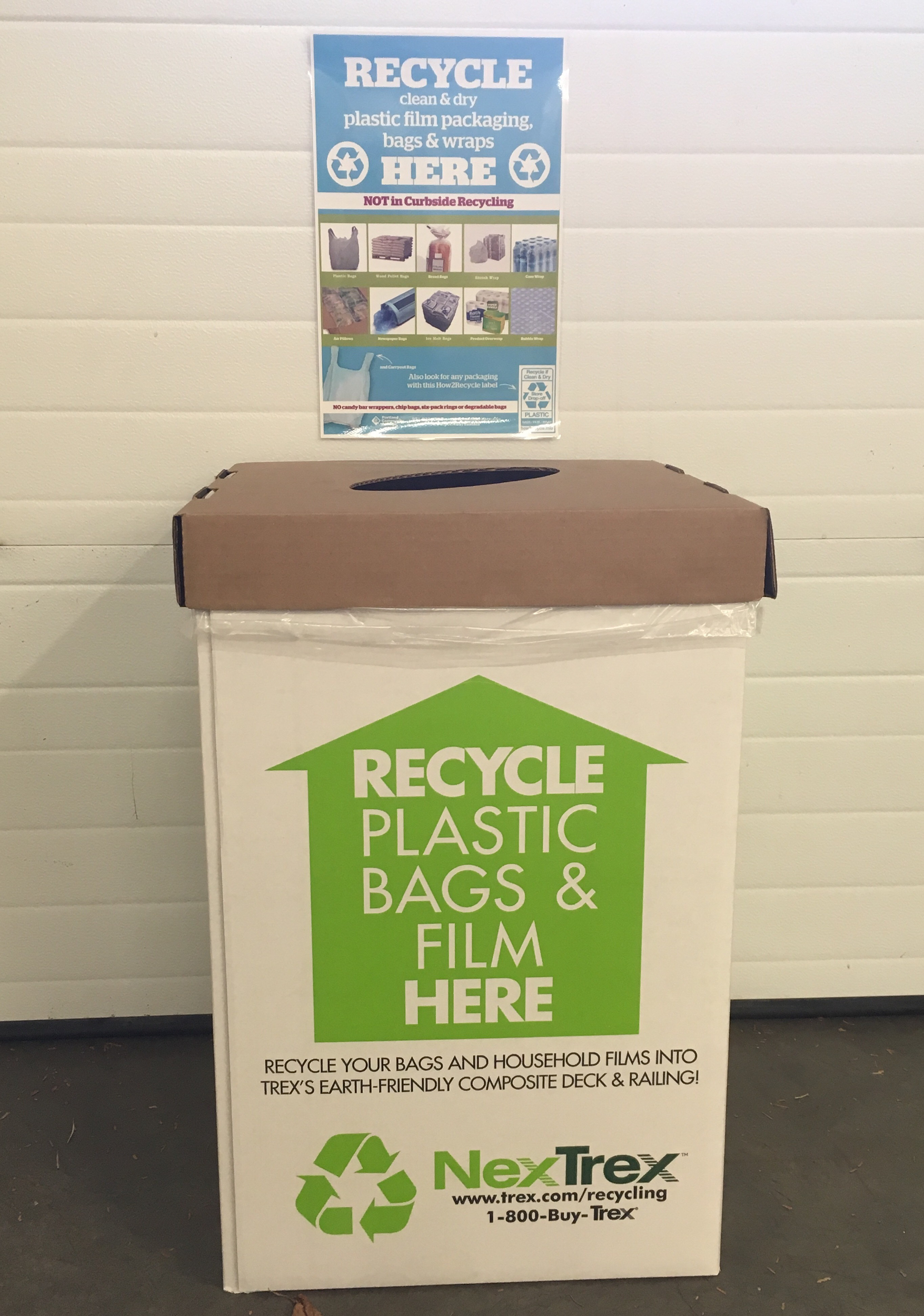
When we donate our unwanted plastic materials to TREX, not only are we helping to keep thousands of pounds of waste out of landfills, we are also helping them continue to create beautiful and environmentally responsible outdoor products. TREX provided PCC with collection containers and posters to set up our program, in exchange for us sending our material to them and reporting weight estimates of all our collected materials. And as an additional incentive for being enrolled in their University Recycling Program, PCC is eligible for high-performance, low-maintenance awards and prizes, like a bench made from plastic film.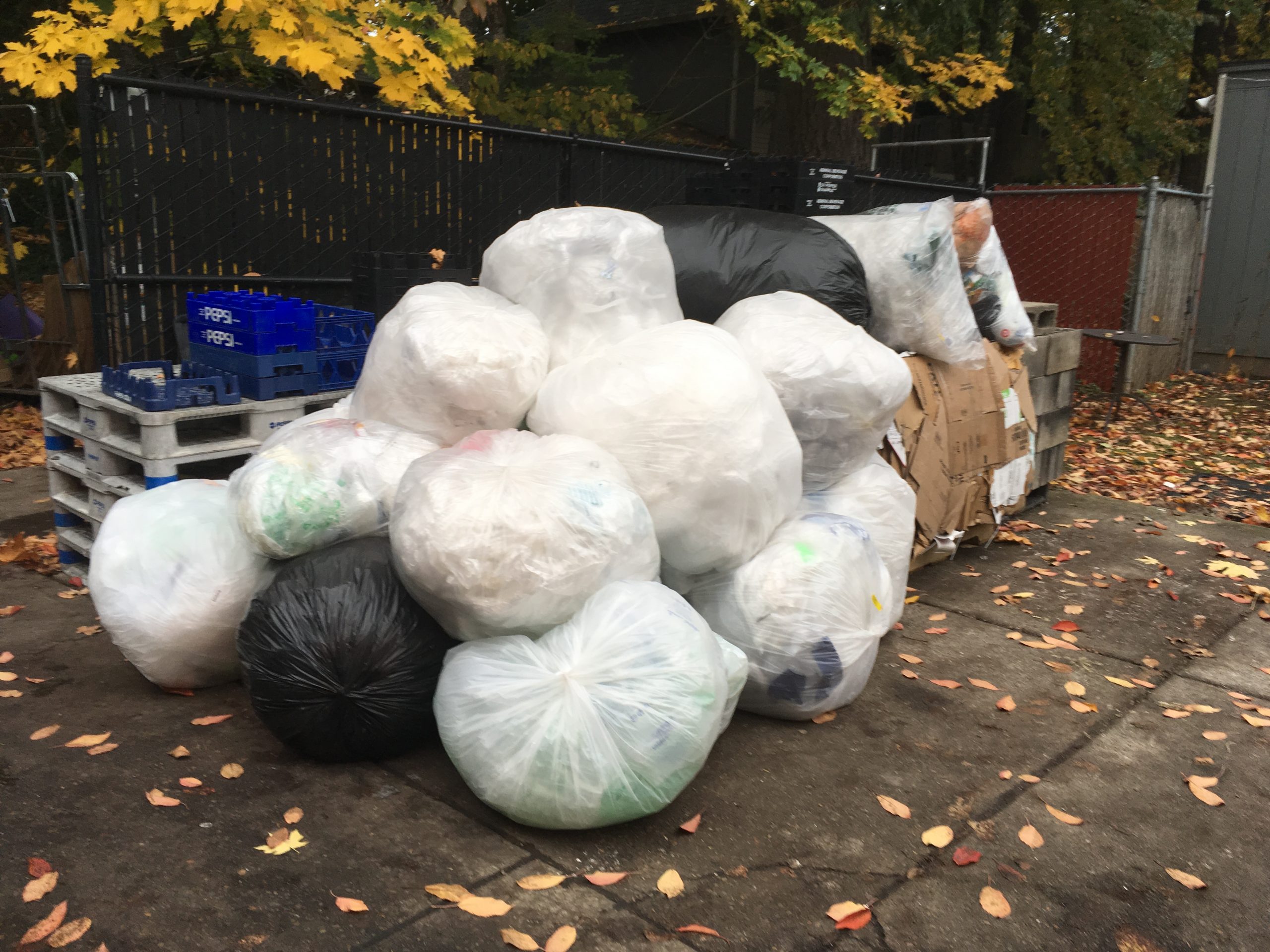
Plastic film material that is allowed in the program includes any type of stretchy plastic film, such as plastic bags, bread bags, shrink wrap, case wrap, air pillows, newspaper bags, ice melt bags, product overwrap and bubble wrap. All materials must be clean, dry and free of food residue. Material can be any color. If you think that your work area may be a large generator of plastic film and would like to join the program, please reach out to sustainability@pcc.edu.
Battery Recycling Service
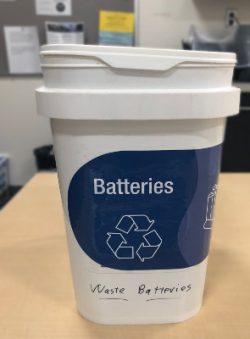
Each campus has battery collection bins located in various departments, offices and centers. The types of batteries that can be placed in the white collection bins are:
- Alkaline
- Lead/acid
- Sealed lead/acid
- Mercury
- Lithium
- Ni/Cad
- Nickel Metal Hydride
- Silver Oxide
An EH& Specialist collects the full bins and then they go to a Facilities Management location at the Sylvania campus where they are bulked in 5-gal or 30-gal containers. After collection, all used batteries at PCC are picked up by Clean Harbors twice a year for recycling and processing.
What do I do if my local battery collection bin is full?
Please make a ready request and your bin will be collected.
Why are the terminals sometimes taped over?
For certain types of batteries, like lithium ion and nickel metal hydride, there can be enough charge left in the battery that if the terminals touch it can cause a spark. Many battery recycling companies require the terminals to be taped over to ensure that contact can’t be made which reduces the risk of a fire.
Where is the Universal Waste Disposal Area on Rock Creek?
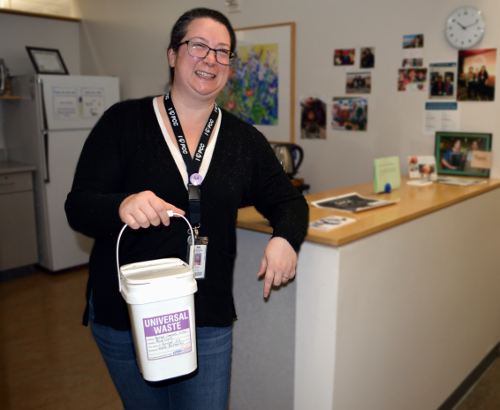
For students at Rock Creek who would like to dispose of batteries, there is a battery collection bucket in Building 5 at the ASPCC counter in the hall. For employees, many departments have a collection bin either in their office mail room or in their work area (like tool or prep room).
Is there a map of where the battery collection bins are located?
There is not a map at the moment. Check back here or EH&S website as a guide, as we plan to have a list published sometime in 2019.
What does Clean Harbors do with the batteries?
We are proud to work with Clean Harbors, who recycles and reuses everything they can, and prepares what they cannot for safe disposal. At their facility the batteries are taken apart into their component materials. Metals and plastics are recycled, valuable components are provided to manufacturers for reuse, and harmful chemicals are neutralized or contained using environment-safe methods.
Eco Social Justice Grant
The Eco Social Justice Grant (ESJG) is an internal grant source funded by student activity fees and administered by the Associated Students of Portland Community College (ASPCC). TGIF grants support projects that help ‘green’ our campuses and reduce our environmental impact.
A long standing partner with the Rock Creek Campus, the ESJG has been integral to and a primary funding source for many campus sustainability projects. These projects include:
- 2018 Green Team Outreach
- 2018 Let’s Get Beezy
- 2016 Bag It: Reusable Bag Initiative
- 2016 Learning Garden Art and Improvement
- 2016 Waste Stream Education Displays
- 2015 Welcome Kiosk-Rock Creek Learning Garden
- 2015 Capacity Building – seasonal staffing (farmhand)
- 2015 Orchard Expansion – 37 fruit trees
- 2015 Bike Trailer
- 2015 Irrigation Expansion
- 2015 Rain Harvesting
- 2014 Portlandia FarmStandia – start up support
- 2014 Designs in Learning – capacity building grant
- 2014 Hydroponics
- 2014 12 Raised Beds in Hoophouse
- 2014 Learning Garden Information Kiosk
- 2014 Apiary establishment – Bee Colonies and Hives
- 2014 Canes & Vines – berry and grape plants for Learning Garden expansion
- 2014 Irrigation Expansion
- 2012 Benches in the Garden
- 2010 Garden Infrastructure
- 2008 Fender Blender Bikes

